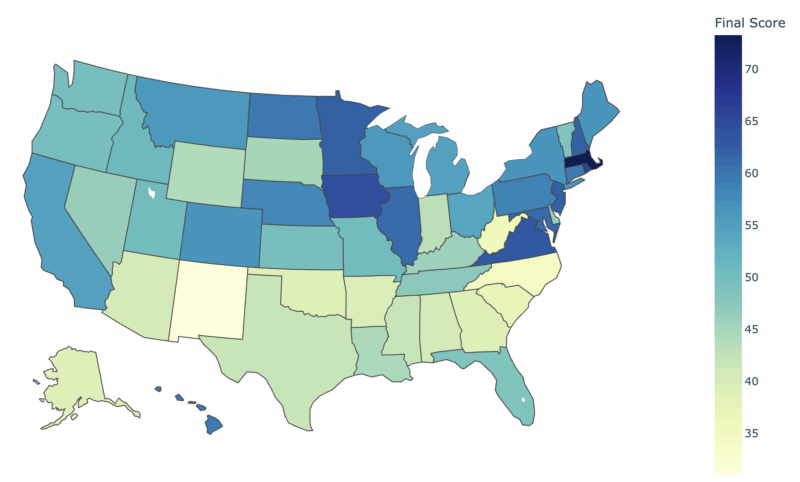
Written by Erica Block
Reviewed by Ronnell Nolan
Expert Reviewer
We want to help you make educated healthcare decisions. While this post may have links to lead generation forms, this won’t influence our writing. We adhere to strict editorial standards to provide the most accurate and unbiased information.
If your son or daughter needs medical care at sleepaway camp, your health insurance policy may or may not cover the cost. Know what your health insurance options are for kids at summer camp.
Editor’s Note: This article was updated June 6, 2021 to reflect new CDC recommendations in relation to the COVID-19 pandemic.
Summer camp. For many American kids, sleepaway camp provides a much-needed break from homework and parental supervision. Nearly 12 million children and teens in the U.S. attend camp each summer. And, while summer camp is generally safe (with low risk of severe injury or illness), stats from the American Camp Association (ACA) show that accidents and illnesses do happen. No parent likes to ponder worst-case scenarios, but if your son or daughter needs serious medical care while at camp, will your health insurance plan cover the cost?
Health Insurance for Summer Camp: Who Pays When Your Child Gets Sick?
Most parents – especially those who once attended camp themselves – realize that campers typically visit the infirmary for reasons that aren’t life-threatening: head lice, poison ivy, homesickness, skinned knees. Occasionally, however, the concerns are more critical.
The swine flu outbreak in the summer of 2009 forced camps throughout the U.S. to quarantine campers who had contracted H1N1. In another example, many camps now require vaccinations because of a 1999 incident at a summer camp in the Berkshires, wherein a 14-year-old camper caught bacterial meningitis and fell into a coma. In more recent years, bullying has received a fair amount of attention.
When such incidents happen, unfortunately, there is no one-size-fits-all answer as to whether your health insurance covers your child at summer camp. Depending on your plan, insurance may or may not cover whatever care your child receives while at camp; it all depends on your family’s health insurance status, the scope and details of your plan coverage, as well as the location of your child’s camp and the type of activities offered there.
As the cost of camp tuition grows increasingly exorbitant, parents are more reluctant to let various ‘what if’ scenarios ruin their investment in their child’s camp experience. Summer camp is a pricey investment, but luckily it’s also one for which parents can prepare and plan ahead. When exploring your coverage options for your kid at camp, these are a few things you need to take into consideration.
CDC Provides COVID-19 Guidance For Summer Camp
- All staff and campers ages 12 and up should get vaccinated before the camp session.
- According to the CDC, camps where everyone has been fully vaccinated, campers can sing, play sports and participate in crafts – except where required by local law.
- More than 2.5 million adolescents ages 12 to 15 have been vaccinated since the Pfizer vaccine was authorized for this age group, according to CDC data.
- At camps where not everyone is vaccinated, the guidance said vaccinated people still do not need to wear masks. But unvaccinated people are “strongly encouraged” to wear masks indoors, and also outdoors, in crowded situations.
- The CDC is also recommending that masking and distancing continue for all people with weakened immune systems.
- Rules subject to state and local declarations.
COVID-19 Guidance For Parents
- Ask if all campers and staff are required to meet 100% vaccination rate.
- See if people who are fully vaccinated need to undergo routine COVID-19 screening testing.
- Find out what protocol is if an outbreak occurs.
- Ask about cleaning protocols.
- Find out what the nearest hospital is; see if health insurance will cover emergency visits.
- Camps have the right to ask if children are vaccinated. It isn’t a violation of HIPAA law.
- In addition to COVID-19 vaccine, all other immunizations should be up to date.
Parents of Campers: Look Into Supplemental Health Insurance
In many situations, your current health plan will provide all the insurance coverage you need for your child at camp. But depending on your financial circumstances and your level of coverage, it may be wise to purchase supplemental insurance to avoid dealing with big medical bills or logistical problems. “Having a safety net can give you [peace of mind] if something unforeseen happens or goes awry [with your kid],” says Mark Ceslowitz, president of TravMark, a specialty insurance company which offers policies specifically tailored to the families of children attending summer camp.
Camps Shift Reliance on Parents’ Health Insurance Policies
This is especially true in light of recent trends which suggest that in response to dipping enrollments and tighter budgets, camp directors are purchasing less comprehensive camper accident and illness insurance policies. ACA data indicates an uptick in the number of camps relying on campers’ parents’ insurance policies to foot medical bills for camper injury and illness. Even if your plan provides adequate coverage for your camper, purchasing supplemental insurance can be beneficial.
Qualifying for a Health Insurance Financial Subsidy
- Vaccines are free of charge to anyone living in the United States, regardless of immigration status or health insurance status. Note that if you combine your COVID-19 with another doctor office visit, you will be subject to pay for the office visit or treatment received at time of service, but the vaccine is free.
- Thanks to the American Rescue Plan, a Special Open Enrollment period is open until August 15, 2021, and more people now qualify for financial assistance. If parents purchase their own health insurance, they might qualify for additional ACA subsidy dollars if they reapply for a major medical health insurance plan through the federal Marketplace or their state exchange.
How to Determine If You Need Supplemental Health Insurance for Summer Camp
If your child is heading to sleepaway camp, here’s how to determine whether it makes sense for you to purchase additional supplemental health insurance for summer camp:
- Review the details of your health plan. Check the fine print of your policy. Call your health insurer if you have any specific questions – cover all your bases.
- Some camps include this fee in camp tuition, so you may have already purchased supplemental coverage for your child.
- Keep in mind that HMO policies will cover only ER visits if your kid’s camp is located outside a predetermined geographical coverage area or it is a life-threatening emergency. Coverage may depend on factors such as your plan’s out-of-network benefits and the location of your child’s camp. Contact your health insurance carrier to inquire about these benefits and aspects of coverage before your child leaves for camp.
- Consider the length of your child’s stay at camp. If the stay is longer in duration (for example, if it lasts 7 or 8 weeks), you may want supplemental coverage.
- Does your child have any health issues which could increase the likelihood of needing medical care? If your kid is diabetic or has a severe food allergy, consider how your child’s condition may affect the cost of care they may need.
If you need more coverage than your current health insurance policy provides (or if you have no coverage to begin with), your child’s camp may be able to help.
- Most insurers serving the camp industry provide policy coverage which “drops down” to cover campers who don’t have health insurance and need medical care.
- Some camps sell coverage add-ons directly to families, though these add-ons have become less common. Typically, this type of coverage includes a “limited medical reimbursement” policy limited to emergency and first aid services.
- Alternatively, a smaller number of camps work with insurance companies that sell families low-cost, short-term health insurance policies to cover the duration of your child’s time at camp.
- If your child is enrolled in a CHIP or Medicaid plan and is going away to camp for the summer, contact your child’s benefits provider to ask any questions you may have about coverage.
Camp Accident and Sickness Plans
More recently, the insurance industry has developed hybrid accident and illness coverage for campers that applies on an excess or secondary basis. Essentially what this means is that if a camper is injured or gets sick, their parents’ health insurance plan will pay for medical expenses first. Once those benefits are used up, unpaid balances such as a deductible, coinsurance, copayment, or any uncovered amount, are paid by the camp’s “blanket” or “excess” policy.
Teen Tours or Athletics Camps: Other Considerations
Teen tours and athletic programs pose unique insurance issues, Mike Cottingham explained to The Wall Street Journal in 2002. Cottingham directed a company that runs travel programs for young adults.
“Unlike a traditional summer camp, you don’t have an infirmary and nursing staff on duty,” said Cottingham. “That means relying on emergency rooms where it could cost $150 to have someone look at an infected blister.”
When you’re deciding whether it makes sense to purchase an additional health insurance policy, consider the activities in which your child will be participating. Are the activities especially dangerous or risky? Most camps don’t charge for care provided at the camp’s on-site infirmary, but for camps where there’s an emphasis on backcountry hiking or excursions, there’s a greater risk of incurring charges. The same applies to sports training camps, such as football or lacrosse camps, where your camper will be engaging in intensive contact sports.
The Bottom Line
It’s all about weighing the costs. Sure, most family health insurance plans cover emergency room visits; however, your plan may not cover a remote helicopter evacuation if your child breaks his or her leg in the forest. Parents should read insurance policies carefully to make sure their kids have the coverage they need during their stay at camp. Health insurance coverage is important every day – and even more so when your child is away from home.
Thank you for your feedback!
American Camp Association. “ACA Facts and Trends.” acacamps.org (accessed July 2017).
Lewin, Tamar. “Summer Camp ’09: A Swim, a Cough, a Quarantine.” The New York Times, July 22, 2009 (accessed July 2017).
Caplan, Callie. “Nick Springer speaks about meningitis awareness on road to Rio Paralympics.” USA Today, July 18, 2016 (accessed July 2017).
Braverman, Beth. “6 Ways to Save Money on Summer Camp Expenses.” Consumer Reports, June 2, 2018 (accessed July 2017).
“TravMark Offers Summer Camp Insurance for the 2015 Season.” Press release, April 20, 2015, GlobeNewswire (accessed July 2017).
American Camp Association. “Camper Medical Risks and Trends.” acacamps.org (accessed July 2017).
Asinof, Lynn. “Check on Insurance Coverage Before Kids Head Off to Camp.” The Wall Street Journal, June 20, 2002 (accessed July 2017).


 by
Ronnell Nolan |
Updated on
August 17, 2025
by
Ronnell Nolan |
Updated on
August 17, 2025 




